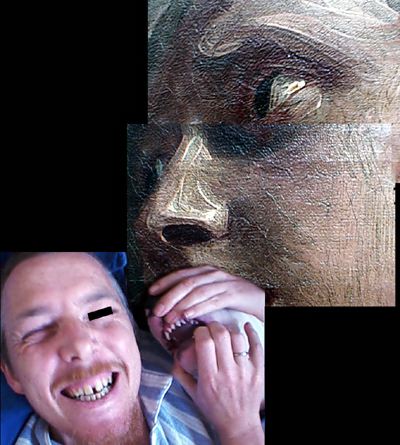


|
Harwood's pajamas, Dog's Teeth and a bit of English Art 2000Harwood 24/10/60 Born in Brighton, England Harwood started out as an artist during the 1980s. He was involved with publishing initiatives such as the Working Press, (books by and about working class culture); Underground newspaper, (a London-based free newspaper aimed at promoting and exploiting the uses of new media in culture and society); and books such as Unnatural - techno theory for a contaminated culture (theoretical positionings on new media). During this time, he produced the first computer-generated graphic novel If Comics Mental and was widely published in graphic journals in the USA, Canada, Italy and France. After Harwood trained in new media and learned programming at the end of the 1980s, he was invited to make a piece of work for Video Positive '95 (international video art festival in Liverpool). He worked at Ashworth maximum security hospital in Liverpool where he produced Rehearsal of Memory the installation. As an educationalist he worked on various new media courses at Guildhall University, and advised on numerous other academic new media initiatives. Disappointed with the state of academic education, Harwood was invited to work at Artec (London Arts Technology Centre) where he provided innovative training for the long-term unemployed. It was here that he received his Arts Council funding to develop Rehearsal of Memory with Artec and ex-trainees to produce, re-author and publish the CD-ROM version of the installation. Since, Harwood has exhibited and spoken at numerous events, nationally and internationally, in England, France, Austria, Australia, Germany, Canada, Portugal, Finland, Holland and Norway. In 1997 Harwood left Artec to Form Mongrel, with Matsuko Yokokoji and Richard Pierre-Davis. Mongrel has created collaborative, socially engaged cultural products including National Heritage and the Natural Selection search engine to international acclaim. In 1999 Harwood/Mongrel received two national awards, The Clarks Digital Bursary and the Imaginaria Award from which emerged the software Linker - exhibited at the Institute of Contemporary Art and Watershed Bristol. Since taking a back seat in Mongrel, Harwood has been able to concentrate on research in two key areas, software as culture and the history of medicine. |
